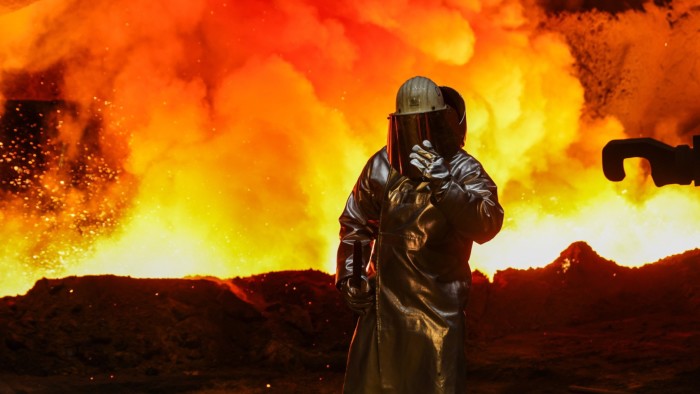Physical Address
304 North Cardinal St.
Dorchester Center, MA 02124
Physical Address
304 North Cardinal St.
Dorchester Center, MA 02124

Digest opened free editor
Rola Khaleda, FT editor, chooses her favorite stories in this weekly newsletter.
The Plann Trump imposed 25 percent of customs duties on steel and aluminum imports restores one of his biggest commercial movements during his first term as president.
In March 2018, Trump made a 25 percent tariff on steel and 10 percent on aluminum against most countries, using national security as a justification, before extending it to the European Union, Canada and Mexico in June.
Trump at the time claimed that they would reduce the trade deficit and enhance local manufacturing.
US imports of minerals fell immediately. In total, about 6.4 billion euros of steel and aluminum exports were struck by the European Union. Brussels took three months to respond, but then imposed fees worth 2.8 billion euros of American imports, which includes about a third of the steel and aluminum products, a third of agricultural products and a third of other goods.
The bloc has dedicated famous American products, which are often produced in Republican states, such as Bourbon Whisky and Harley-Davidson Motorcycles and Jeans. Since then, American whiskey exports to the European Union have decreased a third of a loss of about 256 million dollars, according to the Mattarian Souls Council in the United States.
However, the customs tariff for imports from the European Union became full of exemptions after successfully argued that they needed imports of certain degrees of minerals and parts.
Car companies, including General Motors and Ford, were forced to reduce their profit expectations or the expectations of missing analysts in 2018 due to the induction uncertainty, as well as the high costs of raw materials caused by steel duties to the United States.
Although many American car manufacturers bought most of the steel locally, they are still beaten as local steel producers took the opportunity to raise their own prices. Products also increased their own production after the definitions.
Trump later granted many trading partners, including Canada and Mexico, exempt from customs duties.
After Trump left his post, the United States, the European Union, Japan and the United Kingdom agreed to a temporary truce when then President Joe Biden removed the customs tariff, and agreed to the shares that duties are applied to minerals. The European Union froze all its measures.
The truce is due to the end of the European Union at the end of March, while the American shares that replaced the definitions will end at the end of the year.
Biden and Trump sought the garbage on Chinese imports. Last year, the Biden administration doubled the Chinese steel and aluminum entering the United States.
Biden also stressed the rules that allowed some Mexican steel imports to enter the United States, exempt from customs duties by re -applying the 25 percent definitions of any steel from the country that did not melt and poured into North America. Biden officials have developed this step as an attempt to keep the Chinese steel outside the United States market.
The definitions that have already waved on the horizon have already resulted in the instability of investors in those most exposed industries.
The stocks fell in some European steel makers on Monday morning after Trump’s announcement. Arceelormtal, which generates about 13 percent of its sales in the United States, is severely exposed. The company sells high -value steel products in the United States, especially from its Canadian operations, and it is a major resource for the American auto sector. It also provides semi -inverted steel products from Mexico to its facilities in the United States.
However, the company’s financial manager insisted last week that any controlled effect based on what happened in 2018 when compensates for higher costs at the highest costs.
The European Union industry is also concerned about the flow of imports from the United States. Brussels introduced the quota system, above, which imports 25 percent, which must end in June next year.
“Our biggest threat is cheap imports from China,” said one of the European steel executives. “If they cannot import to the United States, they will likely import more to Europe.”
The auto industry is likely to be exposed again – with the possibility that the exemptions may weaken the strike again. This time comes the threat of customs tariffs as manufacturers are already struggling with the shift to electric cars and the standard emissions standards, making it difficult for them to absorb the costs of high raw materials.
Volvo Cars has already warned of a decrease in profitability this year, noting the uncertainty surrounding Trump’s definitions. “There will be a tariff. Jim Rawan, CEO of the Swedish Group, said last week:” You will see some political geography and some changes in politics so that it will create general turmoil. “